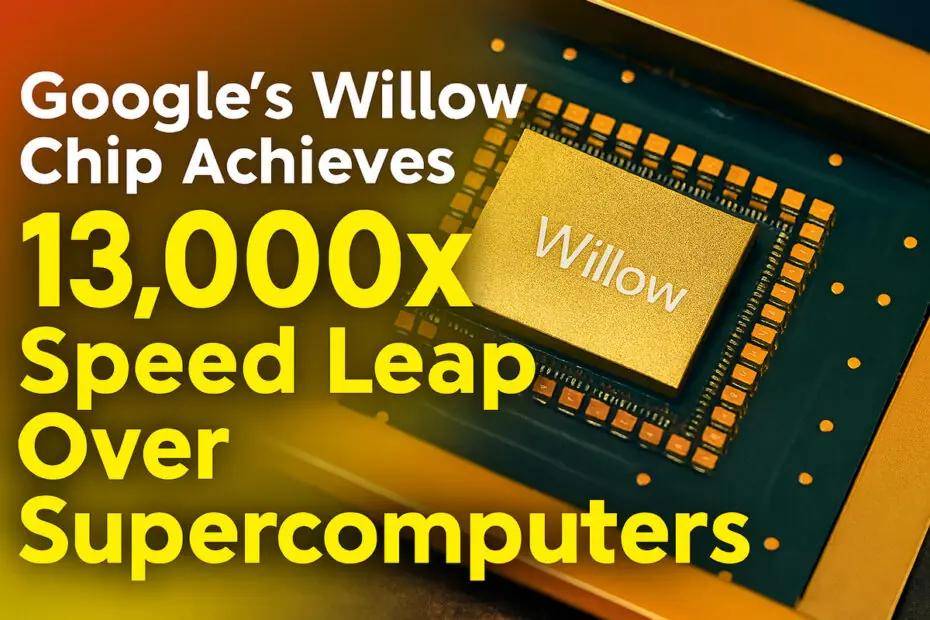Google’s research team has taken an important step toward making quantum computing practical. The new findings suggest that these powerful systems are moving beyond theory and inching closer to solving real-world problems.
The project was jointly led by Michel H. Devoret, a Yale physicist recognized with the 2025 Nobel Prize in Physics for his pioneering work in quantum computing. This week, Devoret and his team at Google’s Quantum AI Lab in Goleta, California, revealed that their superconducting chip, dubbed Willow, has successfully executed a new algorithm known as Quantum Echoes.
When researchers put the machine to the test, the outcome, shared in Nature, was remarkable: it finished specific computations 13,000 times faster than the world’s most powerful supercomputers.
Looking back on the milestone, Dr. Devoret said future versions of the technology might handle problems no classical computer could ever solve. He traced this achievement to research from the 1980s, when he and his team at UC Berkeley proved that electrical circuits could mimic quantum phenomena like superposition and tunneling. That discovery, which eventually earned a Nobel Prize, set the stage for the superconducting qubits at the core of Google’s quantum computers today.
The core strength of a quantum computer comes from its qubits. Unlike classical bits, which can only represent a 0 or a 1, qubits can occupy both states at once. This property allows quantum computers to consider many possibilities simultaneously. When qubits become entangled, their collective processing power expands exponentially. Yet this extraordinary potential comes with a weakness: Qubits are extremely sensitive to even tiny disturbances in their surroundings, such as heat or vibration.
Google’s Willow chip takes on one of quantum computing’s biggest hurdles directly. With 105 qubits, it runs at temperatures near absolute zero to stay superconducting and stable. The system uses cutting-edge error correction to keep mistakes to a minimum, improving as more qubits are added. Google says the chip hits impressive precision, over 99.9% fidelity for single-qubit gates, and stays coherent long enough to perform the demanding Quantum Echoes algorithm.
The algorithm explores how quantum information can bounce back and interfere with itself, creating what researchers call ‘echoes’ of entangled states. Those echoes could make it possible to study the fine details of molecular structures, paving the way for faster breakthroughs in drug discovery and materials science. Google’s team also believes the method could supply useful training data for AI models in fields that currently lack large, reliable datasets.
Tom O’Brien, a research scientist at Google, pointed to one thing that sets the experiment apart—its results can be trusted. They can be verified on other quantum devices or recreated in the lab. ‘If I can’t tell you the data is correct, if I can’t prove to you the data is correct, how can I do anything with it?’ he asked, driving home the point that confidence in the data is the foundation of this emerging field.
Although quantum computing is still in its experimental stage, many independent experts agree that Google’s recent progress brings the field closer to practical application. Prineha Narang, professor of physical sciences and engineering at UCLA, noted, ‘We’ve seen tremendous advances in hardware.’
Amid growing global competition, from IBM, Microsoft, and Amazon to China’s $15 billion quantum initiative, Google claims a defining achievement. Company leaders say the Willow chip delivers the first ‘verifiable quantum advantage,’ showing it can complete reliable tasks beyond the reach of conventional computing.
Alongside their main results, Google’s team shared a companion study on arXiv exploring how the Quantum Echoes algorithm might refine nuclear magnetic resonance (NMR), a technique central to chemistry and medicine for examining molecular interactions. Co-author Ashok Ajoy, a chemist at UC Berkeley, said he was cautiously hopeful: ‘It’s still early days, but the prospects are exciting,’ he noted, pointing to its potential to transform the study of complex biological systems.
Maybe you would like other interesting articles?

